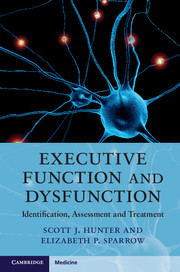Book contents
- Frontmatter
- Contents
- Editor biographies
- List of Contributors
- Preface
- Acknowledgments
- Introduction
- Section I Foundations of Executive Function/Dysfunction
- Section II Executive Dysfunction in the Neurodevelopmental and Acquired Disorders
- Section III Applications
- Appendix 1 Abbreviations used in the book
- Appendix 2 Tests/tasks referenced in the book
- Index
- References
Introduction
Published online by Cambridge University Press: 05 October 2012
- Frontmatter
- Contents
- Editor biographies
- List of Contributors
- Preface
- Acknowledgments
- Introduction
- Section I Foundations of Executive Function/Dysfunction
- Section II Executive Dysfunction in the Neurodevelopmental and Acquired Disorders
- Section III Applications
- Appendix 1 Abbreviations used in the book
- Appendix 2 Tests/tasks referenced in the book
- Index
- References
Summary
Executive functioning (EF) is a cognitive capacity that is difficult to define succinctly. Most explanations of EF reflect some degree of self-regulation as applied to cognition, emotion, behavior, adaptive functioning, and even moral reasoning and choice. In line with this, multiple models have been proposed to account for and explain the range of capacities and acts that represent EF, although the predominant models are adult-centric, and as a result, less applicable to thinking about EF developmentally. It is difficult to ignore the fact that nearly every neuropsychological evaluation in the clinical setting reveals and then attempts to address some aspect of executive dysfunction (EdF). EF deficits have a significant impact in multiple domains of a person's life and the lives of others around them, including parents, teachers, siblings, and peers. The pervasive and at times quite impairing nature of EdF calls for attention and emphasis from researchers and clinicians alike.
With this volume, the reader will find that we promote a model that emphasizes the plurality of executive functions, as opposed to a model that views EF as a singular (albeit still dynamic) cognitive capacity. Clinical and empirical data provide examples of dissociability within EF, at both the level of neural organization and skill demonstration. We also find that EF is best represented as a spectrum, such that too much or too little of a particular EF skill can represent EdF. For example, poorly controlled emotion and behavior are EF deficits in the Disruptive Behavior Disorders (Chapter 5), and overly controlled emotion and behavior are EF deficits in the Anxiety Disorders (Chapter 10). Even when none of the EF skills assessed show a significant deficit, the cumulative effect of multiple EF deficits can result in severe impairment (i.e., the whole is greater than the sum of the parts). We address this directly in Chapters 2 and 4, in particular.
- Type
- Chapter
- Information
- Executive Function and DysfunctionIdentification, Assessment and Treatment, pp. 1 - 4Publisher: Cambridge University PressPrint publication year: 2012



